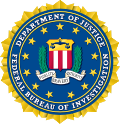| Deputy Director of the Federal Bureau of Investigation | |
|---|---|
 Seal of the FBI | |
 Flag of the FBI | |
| Reports to | Director of the Federal Bureau of Investigation |
| Appointer | Director of the Federal Bureau of Investigation |
| Inaugural holder | Clyde Tolson (BOI) |
| Formation | 1930 (as Associate Director) |
| Deputy | Associate Deputy Director of the Federal Bureau of Investigation |
The deputy director of the Federal Bureau of Investigation (formerly known as the associate director) is a senior United States government position in the Federal Bureau of Investigation (FBI). The office is second in command to the director of the Federal Bureau of Investigation. If the director is absent or the position is vacant, the deputy director automatically takes on the additional title and role of acting director. The office is also the highest position attainable within the FBI without being appointed by the president of the United States. Responsibilities as deputy director include assisting the director and leading prominent investigations. All other FBI executives and special agents in charge report to the director through the deputy director.
Contents
Dan Bongino became the 20th deputy director in March 2025. In August 2025, the Department of Justice announced a co-deputy structure, with Missouri attorney general Andrew Bailey appointed to serve alongside Bongino. Bailey assumed the role September 15, 2025 after resigning as attorney general. [1] [2] Bongino resigned in January 2026 and was succeeded by Christopher Raia.



















